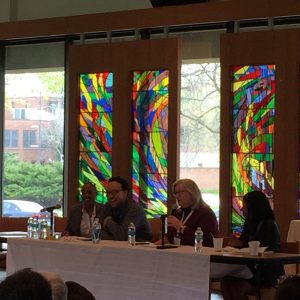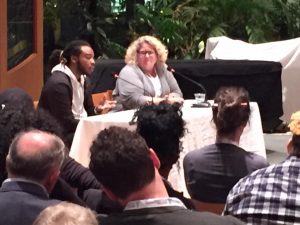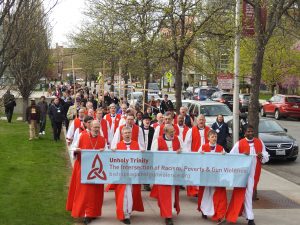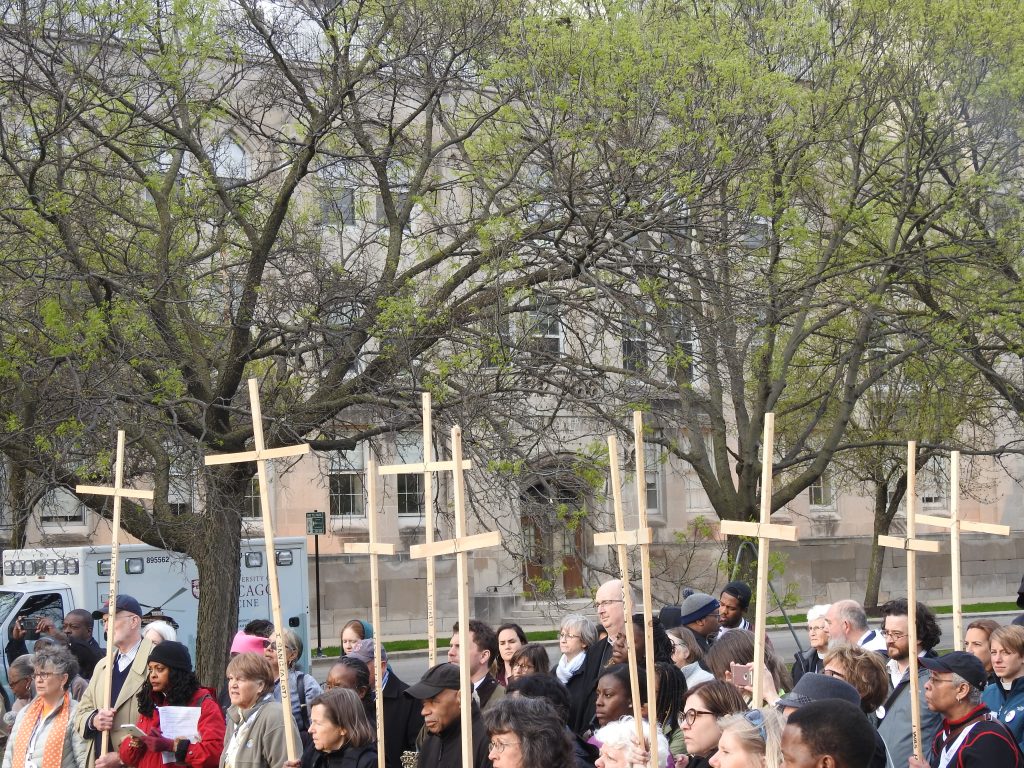A personal reflection on the Unholy Trinity conference held last weekend in Chicago.
“You cannot be White and be a Christian.”
Is that what I just heard her say? I doubt that I was the only White person in the room who wondered for a moment, then, what I was doing here. The Revd Dr Kelly Brown Douglas, not one to mince words, was uncompromising in her analysis of the racial background of an America where “violence … is as American as cherry pie,” as she quoted from Jamil Abdullah Al-Amin.
For the White church to repent of its complicity in a system where White superiority is threatened by the very existence of Black people, and therefore seeks to eradicate them, means to do something different than “being White,” Douglas argued. The dismantling of violence begins with the dismantling of the myth of White purity and perfection, at the cost of Black lives.

Douglas was one of the “three-note” speakers at last weekend’s Unholy Trinity conference, held at the Lutheran School for Theology in Chicago and facilitated by Bishops United Against Gun Violence, with support from Canticle Communcations; and she was as convincing and convicting as ever.
She was joined on a panel moderated by President of the House of Deputies, the Revd Gay Clark Jennings, by the Revd Julian DeShazier, also known as rapper J.Kwest, and Natalie Moore, a journalist and author deeply steeped in the stories of Chicago’s south side.
Moral leadership does not happen on a continuum, DeShazier argued. Churches cannot wait until things get to a certain level of crisis in order to develop the moral arguments against racism, poverty, and violence. But churches also need to develop the humility to be led by the communities that they seek to serve. It is not enough to do good deeds to or for people. Generosity thrives in conditions of injustice that make it necessary.
Moore went so far as to wonder what it would look like if every congregation with a greater than 50% proportion of White members were required to partner with a local organization working to dismantle racism and systemic barriers – and to learn from them.

The three-note speakers and their panel discussion were the centerpiece of a three-day gathering full of remarkable moments. On the first evening, we had the opportunity to hear from Deamonte Lee, a young man who was shot five times as a 15-year-old playing basketball in the park. Now about to graduate high school, he attended with the Revd Carol Reese, a chaplain at a trauma center in Cook County, to talk about the effects of gun violence on its victims. Reese was one of those offering workshops the next day, on anything from her work with trauma victims, to working with the Movement for Black Lives, to communicating effectively with media partners.
The day culminated in a public witness to the determination to address racism, poverty, and gun violence. Twenty-five bishops (and a bishop-elect) were followed through the streets of Hyde Park by around 120 other attendees from 37 Episcopal dioceses and a handful of other denominations, including a substantial youth/young adult delegation from the Diocese of Massachusetts.

A local Roman Catholic activist, the Revd Michael Pfleger, addressed the gathering, demanding that the church not fall silent on issues of life and death in its communities.
On the final morning, conference attendees were given the opportunity to network and share resources with one another; food for the journey. As we shared final reflections, Jim Naughton, of Canticle Communications, raised the ghost of Rizpah, whom we had met during one of the contextual Bible Study sessions, led by Dr Dora Mbuwayesango, that punctuated the conference.
Rizpah was the concubine of Saul, and the mother of two sons sacrificed by David to appease the Gibeonites, whom Saul had slaughtered (2 Samuel 21:1-14). She had no power in herself to prevent her sons’ death, but she kept watch over their bones, holding her vigil until those in power were forced to take notice, and finally to honor the dead.
Rosalind C Hughes attended Unholy Trinity: the Intersection of Racism, Poverty and Gun Violence: A Conference Facilitated by Bishops United Against Gun Violence, April 20-22, Chicago

